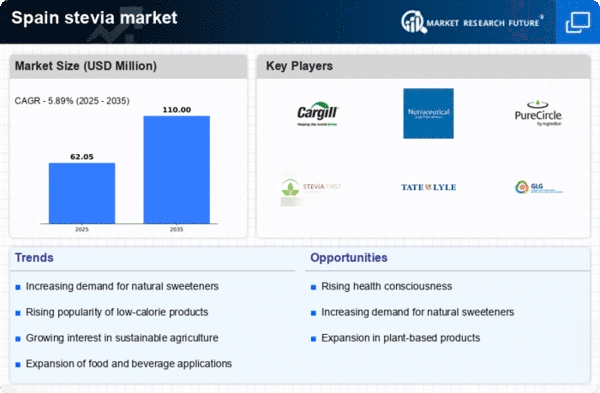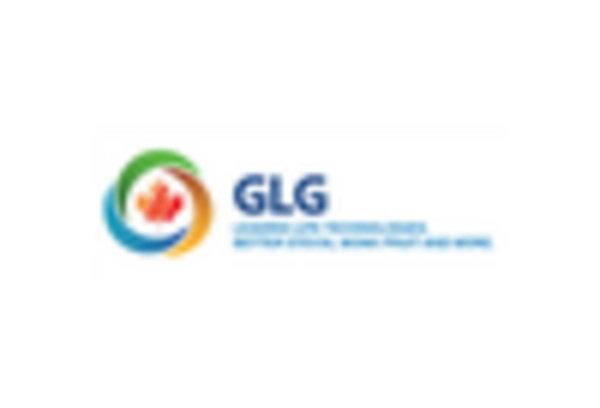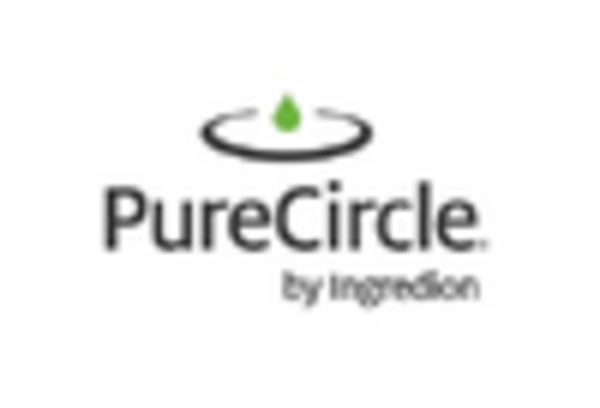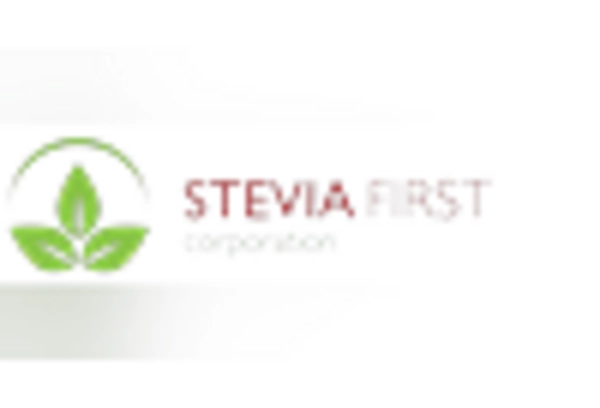Growing Awareness of Health Benefits
The heightened awareness of the health benefits associated with stevia is a significant driver for the stevia market. In Spain, consumers are increasingly informed about the advantages of using stevia as a sugar substitute, particularly its role in weight management and diabetes control. Research indicates that stevia can help reduce overall sugar intake, which aligns with the growing trend of health optimization among the population. This awareness is likely to contribute to a projected growth rate of 20% in the stevia market over the next five years. As educational campaigns and health initiatives continue to promote the benefits of natural sweeteners, the demand for stevia is expected to rise.
Rising Demand for Natural Sweeteners
The increasing consumer preference for natural sweeteners is a pivotal driver in the stevia market. In Spain, health-conscious consumers are actively seeking alternatives to artificial sweeteners, which are often associated with adverse health effects. This shift is reflected in market data, indicating that the demand for stevia-based products has surged by approximately 25% over the past year. As consumers become more aware of the benefits of stevia, including its zero-calorie content and low glycemic index, the stevia market is likely to experience sustained growth. Furthermore, the trend towards clean label products, where consumers prefer transparency ingredient sourcing, further propels the demand for stevia as a natural sweetener.
Sustainability Trends in Agriculture
Sustainability trends in agriculture are increasingly influencing the stevia market. In Spain, there is a growing emphasis on sustainable farming practices, which aligns with the cultivation of stevia. As consumers become more environmentally conscious, they are more inclined to support products that are sourced sustainably. The cultivation of stevia requires less water and land compared to traditional sugar crops, making it an attractive option for eco-conscious consumers. This shift towards sustainability is reflected in market trends, with a reported increase of 30% in the sales of sustainably sourced stevia products. As the demand for environmentally friendly products continues to rise, the stevia market is likely to benefit from this trend.
Support from Food Regulatory Authorities
Support from food regulatory authorities plays a crucial role in shaping the stevia market. In Spain, the endorsement of stevia as a safe and acceptable sweetener by health authorities has bolstered consumer confidence. Regulatory approvals have paved the way for the incorporation of stevia in various food products, enhancing its market presence. The European Food Safety Authority (EFSA) has established guidelines for the use of steviol glycosides, which has encouraged manufacturers to explore stevia as a viable ingredient. This regulatory support is likely to facilitate a steady growth trajectory for the stevia market, as more companies seek to align their products with consumer preferences for natural ingredients.
Innovations in Food and Beverage Products
Innovative product development within the food and beverage sector significantly influences the stevia market. In Spain, manufacturers are increasingly incorporating stevia into a variety of products, ranging from beverages to baked goods. This diversification is crucial, as it caters to the evolving tastes and preferences of consumers. Recent data suggests that the introduction of stevia-sweetened beverages has led to a 15% increase in sales within this category. Additionally, the rise of functional foods, which offer health benefits beyond basic nutrition, has created new opportunities for stevia. As companies continue to innovate and expand their product lines, the stevia market is poised for further expansion.
















